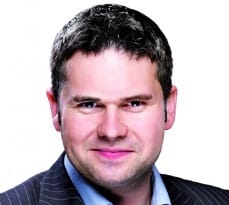While many of today’s technology start-ups opt for opaque and outlandish names, Audio Analytic does exactly what its name suggests. The Cambridge-based company is a world-leader in intelligent sound detection using software sensors, which can distinguish a range of noises from breaking glass and smoke alarms to gunfire and even aggressive verbal behaviour.

Audio Analytic was formed by Dr Chris Mitchell in 2010 to find commercial applications for PhD research – in particular his own doctoral work in sound information systems and signal processing. Today it employs more than 10 people and is backed by Cambridge Angels – a group of investors who provide funding and mentorship to early-stage companies. The latest investment round raised a sum just short of £1million.

Its technology is used in a range of consumer applications, including baby monitors, domestic security systems and more sophisticated home-automation hubs, helping to realise the concept of an “internet of things”. Chris says: “Our biggest partner is a company called Swann Communications, which in the UK sells to people like Maplin and Screwfix. In the US it sells to Walmart, Costco and Best Buys, among others. This is for home-automation and security offerings – they have a system called SwannOne, which has a range of our analytics inside it. It can provide a complete home-automation service.”
Audio Analytic software is also used widely in professional security contexts, such as CCTV, network video recording and physical security information management. “A major partner of ours is Cisco Systems,” he says. “We sell into their professional security division, which uses our analytics to detect things like gunshots, car alarms or people getting aggressive.”
Chris began to realise his entrepreneurial ambitions immediately after finishing his PhD, when he won a Nauffman/NGCE Fellowship to explore the commercial implications of his research. This included the chance to train at Harvard Business School and with Cisco. However, he realised that to start a company in Cambridge, he would need a different take on business education from that offered in the United States.
He decided upon the Ignite programme at Cambridge Judge Business School, for which he received funding from the East of England Development Agency. He says: “Harvard was very US-centric, looking at American ways of doing things and raising money. I wanted the company to be established in Cambridge, so I needed connections to the networks around here. Obviously, that’s a big value that comes out of Ignite because of the type of people that they get involved.”
Aimed at tech entrepreneurs, the week-long Ignite programme provides practical teaching sessions, expert clinics, mentoring sessions and support from innovators who have experience in the sector. “Its value is all about the people that the programme brings together and the contacts that you make,” says Chris.
It’s not just the other entrepreneurs: there’s also the broader business community of the Cambridge Cluster and the investors. Some of the first investors who came on board in the early days of the company can be traced to Ignite.
Although Audio Analytic is firmly rooted in Cambridge, it has a worldwide reach – more than three-quarters of its business is done outside the UK and the European Union. Chris found the Ignite programme invaluable in supplying an international perspective.
The course was about global growth, not just about growing UK companies. Whatever market you’re after, you need to go after it as a global entity. So you aren’t taught to think ‘I’m going to grow the UK business and expand into Europe, and then expand into America,’ because that’s not the way you grow high-tech scalable companies.
What’s more, its success is being recognised throughout the industry and beyond. In 2014, the company won the Consumer Electronics Technology category at the Institution of Engineering and Technology (IET) Innovation Awards. And most recently, it was included in StrategyEye’s “Silicon Fen – 10 Companies from Cambridge to Watch in 2015”.

